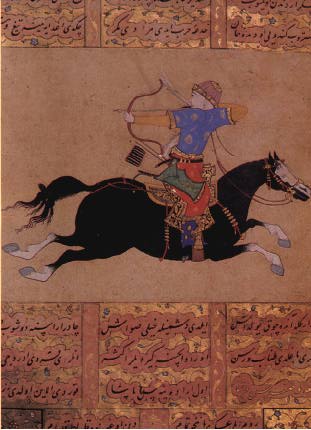Hallo,
recently I have seen the word "toxotai" by Twitter. Plural form of toxotes.
These were the light cavalry with archer function of the Ancient Greek Army who had a short sword and no armor. You can read below on wiki-clippings that these boys were very arm, that's why they didn't have an armor, long sword, &c. We come back to this issue! Later.
Now first of all we look at the word -toxotai-.
I would divide this word freely like this: t-oxo-t-ei
We begin with the middle syllables.
OXO-T
When the Greek want to speak out Ch (like in
CHernobyl), they say TS, because they can not speak Ç (German TSCH, like in TSCHaikowski). That's why I can assume, that the original word for that could be OKÇU (Greek OXU). OKÇU means Archer in Ancient Turkish and ancient Turkish suffix -T made the plural form.
> OKÇU-T means "The Archers" in Turkish. (In modern Turkish OKÇU-LAR).
EI is the Greek suffix. Not important!
The first Syllable T could be (A)T meaning Horse.
Now I can put the syllable's bels together: T-OXOT-EI = (A)T-OKÇU-T
AT-OKÇU-T = Mounted Archers.
(Hippo-toxotai must be a newer definition for these troopers, after they didn't know anymore what -At- meant or they wanted to call them in their own language, Greek.)
According to wikipedia:
(Their strategy / Uzunbacak Adem) => "(HIPPO = Horse) TOXOTAI rode ahead of the cavalry. Most probably they had the job not to penetrate but to outsmart the enemy and to do as if they are not so strong and they must drive back."
In German Wikipedia we can read (Their Strategy):
"Sie schossen die erste Reihe von Pfeilen auf den Feind ab und zogen sich dann hinter die besser bewaffneten Hopliten zurück, ehe die feindliche Armee zum Gegenschlag ausholen konnte."
I know this strategy. It is s the strategy of the steppe. The Turks use this strategy since they are on this earth and mostly with success.
That's why:
(HIPPO) Toxotai must have been light cavalry of the Ancient Greek Army with Asian origin, most probably a Turkish one (We can recognize it by the their name). Full stop.
*
And now back to our "poor" archers:
They had of course no armor and no long sword. Logical. Of course. WHY?
Now imagine: You are an archer on a horse, your job is to shoot at the army and to kill or injure some and you must come back fast without losses. What would you like to wear?
A "HEAVY" armor, a long sword (that prevents you to turn yourself in any direction, to shoot and to run), and a long bow?
OR
A tunica, a belt, a short bow and a short sword?
I mean, they were specialists who were perfectly dressed for success and no poor soldiers who couldn't buy armor and long swords. It is nonsense. They were special forces.
The Turks love(d) their Horse, Arrow and Bow. On their alphabet you can see it clearly.
 |
| Orhun Runes |
Uzunbacak Adem
 |
| Scythian Archers with reflex bow |
 |
| Ottoman Horse Archer (Turkish Toxotes) - Atli Okcu |
 |
| Centauro - raffigurazione medievale - Museo del Louvre |













